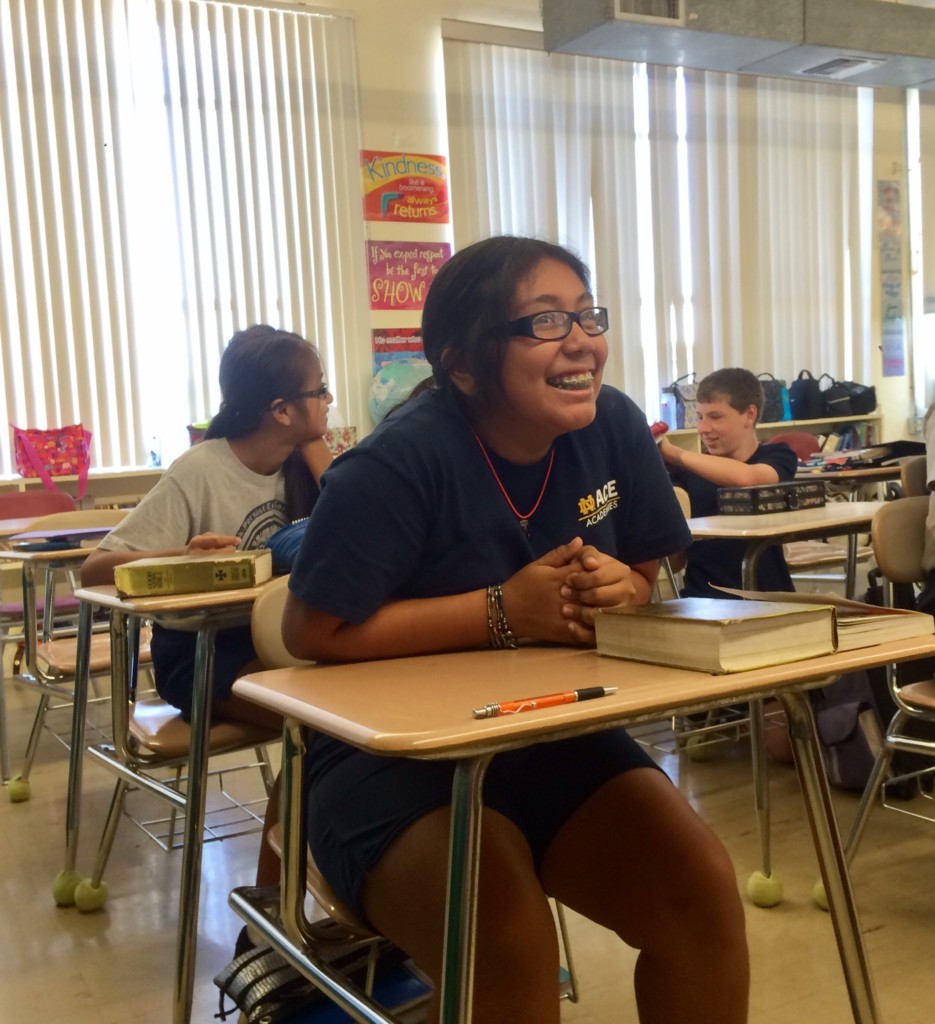As Kayla Yaks advanced at St. Luke Catholic School in Palm Springs, Fla., she developed a passion for art and a plan for what she wanted to do after eighth grade.
She’s hoping for a coveted slot at Dreyfoos School of the Arts, one of the most sought-after magnet programs in the Palm Beach County school district.
But Kayla said this year, she noticed some changes at her school – changes that got her thinking beyond high school.
This fall, St. Luke officially became a Notre Dame ACE Academy, part of a national effort to revitalize Catholic schooling.

There were signs of change students could see. Posters hung around the PreK-8 campus encouraged them to think about a pair of long-range goals: college and heaven. Teachers attended a summer workshop in South Bend, which helped instill a belief that each of their students is capable of reaching both.
There may have been bigger changes happening behind the scenes, but just a few months into the school year, the culture shift had made an impression.
“It showed me that I should have more than one goal, and I can go forward and do something higher than what I just accomplished,” Kayla said.
The emphasis on goal-setting and college attendance would seem familiar to anyone who’s visited a charter school run by an organization like KIPP. But the similarities don’t end there.
There are now ACE Academies in Tucson, Ariz., as well as Tampa and Orlando, Fla. This school year, the network expanded into Indianapolis and Palm Springs, Fla. The 14 schools are run as partnerships between their local dioceses and the University of Notre Dame. The hope is that these arrangements will help improve their operations, reverse enrollment declines and raise student achievement.
Amy Lopez, an experienced administrator in the Diocese of Palm Beach, became principal at St. Luke this year. She said she feels less isolated as a school leader. The university can help with curriculum choices or resources for dual-language students. The network helps connect her with other Catholic educators who serve large numbers of low-income students. Regular check-ins with ACE constantly reinforce the school’s culture, including its Catholic identity.
“It keeps us all accountable, from our administrative assistant down to our maintenance supervisor,” she said, adding: “I don’t think I’ve ever been so driven to be in alignment with what our beliefs are.”
One of the main lessons of education reform, including the country’s top charter networks, is that there isn’t any “secret sauce” that’s common among all schools that improve academic results for low-income children.
But the schools that do well tend to stress a belief in the potential of every child, and develop cultures that push educators to find ways to help their students meet that potential.
This summer, Notre Dame hired a new director for its ACE Academies who spent much of his career in schools with that kind of culture.
Aaron Brenner is a Teach for America alum who helped lead KIPP’s first elementary school in Houston, and went on to help the charter school network expand its primary schools nationally before helping to create a global network of schools that serve low-income children.
Brenner, a lifelong Catholic, said ACE Academies embrace a KIPP-like combination of academics-plus-character. But they also add a third ingredient: Faith formation.
“To me, it’s really an unbeatable recipe,” he said. “It’s really an asset and opportunity that’s unique to Catholic schools.”
Right now, the network is growing in areas where vouchers and tax credit scholarships make it possible for faith-based private schools to serve large numbers of low-income students. The hope is that these clusters of schools can achieve academic results that match those of successful public-school reforms.
“We really want to cultivate … this sense of being a part of a national movement,” Brenner said. “If we can demonstrate that it’s possible, and it’s thriving, and it’s fruitful to build a national network of Catholic schools, we feel like we can really change the game.”
Before this school year, St. Luke was already participating in a separate Norte Dame initiative, aimed at improving science instruction. Demographically, it fits the profile of schools that become ACE Academies.
More than half of its more than 180 students are Hispanic. About a quarter are black. Nearly two-thirds receive tax credit scholarships, which provide tuition assistance to low-income and working-class families. (Step Up for Students, which publishes this blog, helps administer the scholarship program).
While real academic benefits will be years in the making, ACE has already made an impact on some veteran teachers at the school. Gail Spitzschuh, who teaches St. Luke’s religion classes, said the belief that all children, not just some, are capable of making it to college has a way of spreading from teachers to students.
“What kind of long-range effect remains to be seen, but they know it,” she said. “They feel it.”


